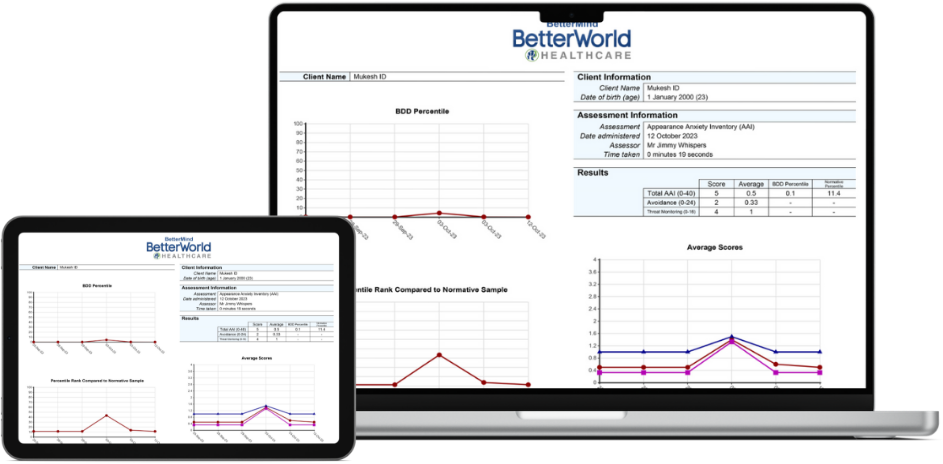Zung Self-Rating Depression Scale (ZUNG)
Assessments
Description
The Zung Self-Rating Depression Scale is a short self-administered survey to quantify the depressed status of adult patients. There are 20 items on the scale that rate the four common characteristics of depression, divided into 4 subscales: core depressive factor; cognitive factor; an anxiety factor; and a somatic factor. This scale is suitable for inpatient use and also the elderly.
Validity
Knight, Waal-Manning, Hendrika and Spears (1983) validated the Zung Self-Rating Depression Scale with 2,120 New Zealanders between 16 and 89 years of age. High estimates of reliability based on internal consistency statistics were found, with females scoring higher. Scores were inversely correlated with age, indicating the importance of specific and appropriate norms in assessing affective states. Split-half reliability studies in a psychiatric population found a correlation (r) of 0.73 (Zung, 1972). In a community survey of 1,173 subjects, Cronbach’s alpha was satisfactory at 0.79 (Knight et al., 1983).
Zung (1965) reported a range of Zung SDS index scores from 0.63 to 0.90 with a mean of 0.74 (total score equivalent of 59) in depressed outpatients, whereas hospital staff control subjects showed a range of 0.25-0.43 with a mean of 0.33 (total score equivalent of 26). Thus, Zung SDS scores discriminated depressed from non-depressed samples.
Romera et al., (2008) examine the symptomatic dimensions of depression in 1049 patients with major depressive disorder (MDD) in the primary care setting by means of a factor analysis, finding four factors: core depressive factor; cognitive factor; an anxiety factor; and a somatic factor. The 4-factor structure was validated and high coefficients of congruence were obtained (0.98, 0.95, 0.92 and 0.87 for factors I, II, III and IV, respectively).
Guy (1976) found that mean total scores for five diagnostic groups were as follows:
65 for depressive disorders (n = 96),
53 for anxiety disorders (n = 22),
48 for transient situational disorder (i.e., adjustment disorder) (n = 12),
52 for schizophrenia (n = 25), and
56 for personality disorders (n = 54).
Thus, the Zung SDS is a non-diagnostically specific indicator of depressive symptomatology.
Interpretation
Results consist of a total score as well as scores for the 4 subscales:
Total scores range from 20 through 80. The average score for an individual with a depressive disorder is 65.
Scores are broken down into the following ranges:
– 20-49 Normal Range
– 50-59 Mildly Depressed
– 60-69 Moderately Depressed
– 70 and above Severely Depressed
The core depressive factor is computed from items 1, 3, 6, 14, 17, 18, 19 and 20. The minimum score is 8 and the maximum score is 32.
The cognitive factor is computed from items 10, 11, 12, and 16. The minimum score is 4 and the maximum score is 16.
The anxiety factor is computed from items 4, 13 and 15. The minimum score is 3 and the maximum score is 12.
The somatic factor is computed from items 5, 7 and 9. The minimum score is 3 and the maximum score is 12.
Developer
Zung, W.W. (1965). A self-rating depression scale. Archives of General Psychiatry, 12, 63-70.
Try it and see how BetterMind can enhance your practice

Support
Frequently Asked Questions
You’ve got questions, we’ve got answers. Below you can find answers to some of the most frequently asked questions. If you can’t find the answer you’re looking for, please feel free to reach out to us at info@betterworldhealthcare.com.
I can’t open test results within the Web Browser
Assessment result PDFs are opened in a new tab within the web browser. If you click the results but they do not open, your browser will be blocking the popup. To resolve this, after you have pressed the test result, look out for an alert at the top of your browser notifying you that a pop-up has been blocked, then click "Allow".
I have forgotten my password. How can I reset it?
If you have forgotten your password please press “forgot password” within the app, or on the Web Browser App login page (https://app.bettermind-app.com/login). You will receive a new temporary password via email.
Can a Practitioner access BetterMind from their Smartphone?
No, A Client /Patient can answer assessment questions on a smartphone but the Practitioners/ Users can't administer BetterMind using a Smartphone. A computer, laptop or tablet will have to be used.


